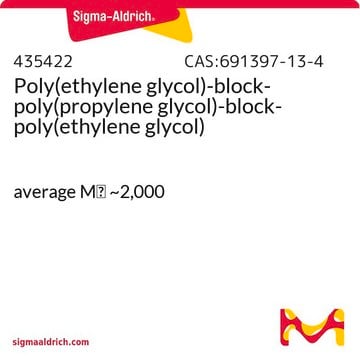435406
Poly(ethylene glycol)-block-poly(propylene glycol)-block-poly(ethylene glycol)
average Mn ~1,100
Synonym(s):
Pluronic® L-31, PEG-PPG-PEG
About This Item
Recommended Products
vapor density
>1 (vs air)
Quality Level
vapor pressure
<0.3 mmHg ( 20 °C)
form
viscous liquid
mol wt
average Mn ~1,100
composition
PEG, 10 wt. %
refractive index
n20/D 1.453
surface tension
47 dyn/cm, 25 °C, 0.1 wt. % in H2O
viscosity
175 cP(25 °C, Brookfield)(lit.)
transition temp
softening point −32 °C
cloud point 37 °C (1 wt. % aqueous solution)
density
1.018 g/mL at 25 °C
HLB
1.0 - 7.0
SMILES string
O2C(C2)C.O1CC1
InChI
1S/C3H6O.C2H4O/c1-3-2-4-3;1-2-3-1/h3H,2H2,1H3;1-2H2
InChI key
RVGRUAULSDPKGF-UHFFFAOYSA-N
Looking for similar products? Visit Product Comparison Guide
Application
Features and Benefits
Physical form
Legal Information
Storage Class Code
10 - Combustible liquids
WGK
WGK 1
Flash Point(F)
Not applicable
Flash Point(C)
Not applicable
Personal Protective Equipment
Choose from one of the most recent versions:
Already Own This Product?
Find documentation for the products that you have recently purchased in the Document Library.
Customers Also Viewed
Articles
Mesoporous materials self-assemble from sol-gel precursors and amphiphiles, forming versatile structures for various applications.
Mesoporous materials self-assemble from sol-gel precursors and amphiphiles, forming versatile structures for various applications.
Mesoporous materials self-assemble from sol-gel precursors and amphiphiles, forming versatile structures for various applications.
Mesoporous materials self-assemble from sol-gel precursors and amphiphiles, forming versatile structures for various applications.
Our team of scientists has experience in all areas of research including Life Science, Material Science, Chemical Synthesis, Chromatography, Analytical and many others.
Contact Technical Service




